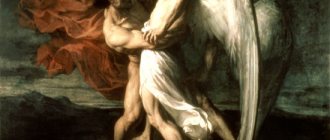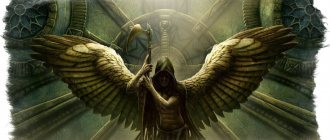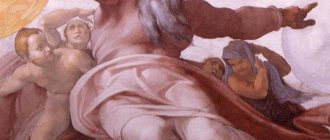Ontological proof of the existence of God
One of the most convincing and original proofs of the existence of God is the ontological proof. That is, proof of the existence of some higher power based on our definition of God or idea of him. It was first proposed by the medieval English theologian Anselm of Canterbury. As he puts it, it reads as follows:
- God is that than which nothing greater can be conceived.
— To think that it exists only in the mind is less than to think that it exists in the mind and in fact.
- Therefore, God must exist both in mind and in deed.
French philosopher René Descartes proposed a similar formulation:
- God is the totality of all perfections.
— Existence is perfection (or existence is more perfect than non-existence).
- Therefore, God must exist.
Descartes' formulation is weaker than Anselm's formulation, since the claim that existence is more perfect than non-existence can be quite controversial and, for example, Buddhists are unlikely to support it. Otherwise, it is almost completely identical.
Anselm of Canterbury
The main works of Anselm of Canterbury.
Anselm of Canterbury is often called "the brightest and most penetrating mind between St. Augustine and St. Thomas Aquinas" and the "father of scholasticism."
Anselm's writings are both philosophical and theological, since in them the author seeks to present the Christian principles of faith, traditionally perceived as undeniable truth, in the form of a rational system.
Anselm also analyzes the phenomenon of language, carefully studying the meaning of religious terms. He, and the thinkers who followed him, such as Pierre Abelard and Guillaume of Conches, were true innovators in Western philosophy in logic, semantics, ethics, metaphysics and other areas of philosophical theology.
Stylistically, the works of Anselm of Canterbury are presented in 2 main forms - dialogues and meditations.
Works of Anselm of Canterbury
The main works of Anselm of Canterbury: “Soliloquy”, “Addition to Discourse”, “Dialogue on Grammar”.
In philosophy he continued the Platonic rather than the Aristotelian tradition.
The main problem of his work is the relationship between faith and reason. Anselm of Canterbury solved this problem from the standpoint of Augustinianism - “I believe in order to understand,” that is, faith precedes reason.
According to Anselm of Canterbury, reason can clarify the truth contained in articles of faith through dialectics. He believed that all revealed truths could be rationally demonstrated.
Objections
The first to criticize Anselm's proof was his own student, the monk Gaunilo of Marmoutier. He proposed to imagine an island that would be larger and more perfect than any other island. In his opinion, if we follow the logic of Anselm’s reasoning, such an island must also necessarily exist.
It is fair to note that the idea of an island as such, unlike the idea of the greatest thing imaginable, does not include the idea of existence. Therefore, Gaunilo's objection cannot refute Anselm's argument.
Scottish philosopher David Hume criticized Anselm as follows. He argued that it is impossible to prove anything based on just the idea of that thing unless the opposite thought leads to a contradiction. For example, many geometric theorems are proven “by contradiction,” that is, through the assumption that the theorem is false and the demonstration that in this case the axioms of Euclidean geometry will be violated. The assumption that God does not exist does not lead to a contradiction.
Classic Proofs for the Existence of God
Over the centuries, theologians and philosophers have produced countless proofs of the existence of God. In the theological annals of the Catholic Church there are more than a hundred of them.
The main feature of European medieval philosophy is theocentrism. Philosophy in this historical period is closely connected with theology. The works of theologians are aimed at substantiating the foundations of the Christian faith, and philosophy is the methodological basis, without pursuing the goal of searching for truth. The main problem of medieval philosophy is the problem of the relationship between faith and reason, which gives rise to disputes about universals and various ways of proving the existence of God from the point of view of philosophy and theology.
Over the centuries, proofs of the existence of God have been created not only by theologians (Anselm of Canterbury, Thomas Aquinas, Malebranche), but also by philosophers (Plato, Aristotle, Descartes, Leibniz). Immanuel Kant was the first, from a purely philosophical position, to reduce them all to three: ontological, cosmological and teleological. Since then, these proofs have come to be called classical proofs of the existence (existence) of God.
The Western European Christian tradition is characterized by the use of rational methods to comprehend the foundations of Christian doctrine. The ontological proof of the existence of God within this tradition has a long history. It can already be found in Plotinus and Augustine. Then, in the eleventh century, Anselm of Canterbury constructed an ontological proof that is considered a classic. The ontological proof was given by N. Kuzansky. R. Descartes reformulates Anselm's proof and strengthens it. Subsequently, N. Malebranche and B. Spinoza provide proof of the existence of God. Fichte, Schelling and Hegel restore the ontological proof. In general, the logical scheme of reasoning in the ontological proof can be presented as follows:
- absolute perfect being has all perfections;
- existence is one of the possible perfections;
- to exist in reality is more perfect than to exist only in imagination;
- if God did not exist in reality, he would not be perfect;
- God, as a perfect being, must exist not only in our imagination, but also in reality;
- therefore, God exists both in concept and in reality. L.M. Grigorieva. The problem of ontological proof of the existence of God: Anselm of Canterbury and Immanuel Kant. // Bulletin of SUSU. No. 28 (204). 2010.
To Anselm of Canterbury the evidence seems obvious and convincing; With this evidence he wanted to convince not only of the existence of God, but also to show the absurdity of unbelief. Anselm was a deeply religious man, so he put faith above reason. The Proslogion expresses this attitude of Anselm: “I strive not to reason in order to believe, but to believe in order to reason, for I also believe that if I do not reason, I cannot reason.” Proslogion // Monuments of medieval Latin literature of the X-XII centuries. M. Moscow: Science. 1972. p. 252. He believed that reason is not sufficient to comprehend God, that the path to comprehension of God is not the path of intellectual activity. Of course, Anselm considered the question of the existence of God in the context of his personal spiritual experience, from the awareness of his relationship to God, from his personal experience. Anselm clearly felt and understood the power with which the concept of God, penetrating into the very depths of the soul, is necessarily associated with the assumption of the existence of God. For Anselm, “to say in your heart and to think are one and the same thing.” The problem of ontological proof of the existence of God: Anselm of Canterbury and Immanuel Kant. // Bulletin of SUSU. No. 28 (204). 2010.
The cosmological proof, it seems to me, is as old as human reason. It is so natural, so convincing, and so capable of enlarging the circle of reflection as our views develop, that it will exist as long as there remains in the world one intelligent being who is inclined to take part in this noble consideration for the purpose of knowing God from his creatures. The only possible basis for proving the existence of God (1763). / Kant I. Works. In 8 volumes. T. 1. M.: HORO, 1994. Pp. 495.
Refutation of Immanuel Kant
The most thorough criticism of this evidence was made by the German philosopher Immanuel Kant. His main objection is that we cannot attribute existence as a property to an object. The existence of anything can only be discovered.
He suggested thinking about a hundred talers that exist only in the imagination, and a hundred talers that exist both in the imagination and in reality. Yes, a hundred talers that actually exist are, of course, much preferable to those that exist only in the imagination. However, the very thought of existing hundred talers is no different from the thought of imaginary hundred talers. The idea of existence adds nothing to it.
Since the ontological proof attempts to derive the statement that God exists from the very definition of God, it had to be as tautological as any definition or axiom. Just as, for example, from the fact that someone is a bachelor, it follows that he is an unmarried man, since the definition of a bachelor includes that he is an unmarried man. Or, as the statement that a triangle has three angles.
But the definition of God does not contain the statement that he exists with the same continuity and certainty as the definition of a bachelor contains the fact that he is an unmarried man, or the definition of a triangle that it has three angles. If a triangle does not have three angles, it will not be a triangle. If a bachelor has a wife, he will not be a bachelor. In these cases, a contradiction to the definition is revealed. However, if God does not exist, then there will be no more contradiction in this than in the definition of a triangle or a bachelor, which does not exist.
Denying the existence of something does not lead to a contradiction in the definition of that something. A triangle with four corners is a contradictory, erroneous definition. But if we say that a triangle with four (or even three) corners does not exist, then there will be no contradiction. By denying the existence of something, we deny all the properties of that thing.
Immanuel Kant
Is there a God? Anselm's ontological argument
Anselm of Canterbury
The ontological argument is the pearl of medieval theology. This is the only proof of God a priori - that is, proof that does not rely on experience, but is based solely on the ability to reason. It is often simplified and depersonalized, altered and distorted. Its beauty and strength, however, lies in the fact that it is formulated perfectly - any deviation leads to a violation of the divine harmony of reasoning.
Anselm of Canterbury (1034–1109) formulated the first version of the ontological argument in his early work “Monologion”, but, apparently, he was quickly disappointed in it, and another version was already included in the “Proslogion”, which glorified Anselm throughout the centuries.
Nevertheless, Anselm is often criticized as if he remained committed to the argument of the Monologue. Let's look at the first version, analyze it, and then compare it with the one Anselm presented in the Proslogion.
Proof from Monologue
Anselm begins his argument with a statement - he is confident that even the average mind is able to figure out whether God exists. There are many ways to figure it out, but he will offer one that he considers reliable:
So, it is quite possible that someone silently says to himself this: if there are so countless goods, of which we feel such a great variety with our bodily senses (experimur), and distinguish them with the rational part of our consciousness (ratione mentis), then shouldn’t we believe, that there is one thing through which all goods are good? Or are different things good through different things? Indeed, it is most reliably known and obvious to everyone who wants to pay attention to this that everything called “something”, such that in relation to each other is pronounced as “more”, “less” or “equal”, is pronounced ( so) through something that is thought in different things not as one thing in one, another in another, but as one and the same thing, it makes no difference whether it is considered to be contained in these (different things) to an equal or unequal degree.
Anselm then takes as an example the idea of what it means to be good, with the help of which he demonstrates that if a thing is said to be good, then they always use the same meaning, referring to some maximally general idea of that what it means to be good. Then, Anselm says, about other goods (for example, useful or honest) one can imagine a reasoning similar to that presented about the good. After which we can draw a general conclusion:
Who can doubt that through which everything is good, there is great good? Then it is good through itself, since every good is (good) through it. Thus, it follows that all other goods are (goods) through something other than what they themselves are, and only this one thing - through themselves. After all, that is the highest, which so rises above everything else, that it has neither equal nor superior. But that which is supremely good (summe bonum) is also supremely great (summe magnum). So, there is one thing, the best and the greatest, that is, the highest (in relation to) everything that exists.
What do we see in this evidence? First, of course, the ancient idea that everything in the world is distributed according to some gradation according to level, degree, intensity or some other attribute: things are built into hierarchies in accordance with the qualities that they possess. From this, in fact, it clearly follows that there must be some kind of super thing located at the top of this hierarchy. Moreover, this super-thing necessarily possesses the desired property in its entirety, since (quite in the tradition of Plato) it is this upper element of the hierarchy that is the quintessence of quality, which in all other objects is not so perfect precisely due to the fact that the super-thing only, as it were, pours out its inescapable completeness into the world, generously but unevenly distributing it among everyday phenomena and objects of the world. Second, we will learn the outlines of many ontological arguments that other philosophers (for example, Descartes or Leibniz) would later formulate. It is this option (derived, no doubt, from Descartes) that Immanuel Kant will criticize in his “Critique of Pure Reason.”
This is how Descartes argues in his Meditations on First Philosophy (Third Meditation):
I affirm that this idea of an all-perfect and infinite being is eminently true; for although one can imagine that there is no such being, one cannot imagine that its idea does not show me anything real, as I said earlier about the idea of cold. The idea of God is extremely clear and distinct: after all, it contains everything that I perceive clearly and distinctly and consider real and true, everything that carries a certain perfection. […] in order for my idea of God to turn out to be the most true, clear and distinct of all the ideas that I have, it is enough for me to understand and make a judgment that everything that I clearly perceive and everything that I know that it carries in a certain perfection for myself, and also, perhaps, many other qualities unknown to me - all this is either formal or primarily inherent in God.
Let us follow Kant’s path and see what’s wrong with the proof of God as a sum of positive qualities, which obviously exists and by its existence ensures the existence of the positive qualities themselves in different “quantities” in certain things in the world.
With sadness, Kant Fr. According to Kant himself, God simply cannot be conceived, so there is no reason to trust any evidence a priori. The main reason for the incorrectness of reasoning of this type is the same - the recognition of existence as a real predicate (that is, a property):
Anything can serve as a logical predicate, even a subject can be a predicate of itself, because logic is abstracted from any content. But a definition is a predicate that is added to the concept of the subject and expands it, therefore it should no longer be contained in it.
It is clear that being is not a real predicate, in other words, it is not a concept of something that could be added to a thing. It is only the positing of a thing or certain determinations in itself. In logical application it is only a connective in a judgment. The position God is an omnipotent [being] contains two concepts that have their own objects: God and omnipotence; the word is does not constitute an additional predicate here, but is only what the predicate posits in relation to the judgment. If I take the subject (God) together with all its predicates (which include omnipotence) and say God is or is God, then I do not add any new predicate to the concept of God, but only posit the subject in itself with all its predicates , and moreover, as an object in relation to my concept. Both of them must have exactly the same content, and therefore nothing can be added to the concept expressed only by possibility, because I think of its object simply as given (through the expression it is). Thus, there is no more in the actual than only in the possible.
What do we see in this Kant's objection? You cannot build evidence about the existence of anything (we are not just talking about God) on the basis of the naive idea that “to be” is the same property (predicate) as others (red, smart, tall). Existence can only be justified empirically - by providing an object from the world that satisfies the definition given in advance. It will never be possible to “find” God in this way, and this simple fact should be taken for granted.
Proof from Proslogion
Kant's objection seems final - we seem to have lost all hope of proving that God exists. However, Anselm's argument from the third chapter of the Proslogion returns this hope to us. What's so special about it? Let's get a look:
So, without a doubt, something greater than which cannot be imagined exists both in the mind and in reality. And it, of course, exists so truly that it cannot be imagined as non-existent. For it is possible to imagine that something exists which cannot be imagined as non-existent; and it is greater than what can be imagined as non-existent. Therefore, if that than which a greater cannot be conceived can be conceived as not existing, then that than which a greater cannot be conceived is not that than which a greater cannot be conceived; contradiction. This means that something greater than which cannot be imagined exists so truly that it cannot be imagined as non-existent. And this is You, O Lord our God.
Look what a neat move! It is impossible to stop admiring the cunning and sophistication with which Anselm formulates the new concept of God: the latter here is not the sum of positive qualities, the almighty ruler of the hierarchies of various earthly goods and virtues. Anselm's argument no longer goes from the idea of what God must be to the assertion that something corresponding to this idea exists. On the contrary, he finds the definition of that which cannot but exist - that which more cannot be conceived. And having easily proven that the object hiding behind such a concept exists, he later calls it God.
If Anselm's formulations seem too ponderous to you, well, that's so. Below is a simplified version of Anselm’s proof. The key word here, as in Anselm himself, is the very insidious “more” (but the magic of the original version is much stronger than this emasculated version):
- It is obvious to everyone that there is something greater than which he cannot imagine (let's call it x).
- Imagine x.
- Consider two cases: x exists only in the mind
- x exists not only in the mind, but also in reality
In fact, the argument began to be criticized as soon as it appeared. The famous Gaunilo (who is only famous for writing a detailed and rather caustic objection to Anselm’s reasoning) reasoned, in particular, as follows. Suppose, says Gaunilo, someone were to tell me that somewhere in the ocean there is an island that is “the most excellent of all lands,” and then this someone were to say that now that I have imagined this island in existence islands can no longer be doubted. After all, an island that exists both in the mind and in reality is superior to an island that exists only in the mind, and our island is the most superior. Gaunilo concludes that if such reasoning is not a joke, then it is not clear who is the greater fool in this story - the one who believes such reasoning, or the one who proposes to believe in this reasoning. Gaunilo insists that “we must first prove by some argument that there is a certain nature that is superior, that is, greater and better of all things (omnium quae sunt), so that on this basis we can also prove everything else, which is necessarily cannot but belong to that which is greatest and best. When it is said that this highest thing cannot be imagined as non-existent, then perhaps it would be better to say that it cannot be understood that it does not exist or even may not exist.”
Reading Gaunilo's objections, one gets the feeling that he was reading the Monologue and criticizing the proof from there, because that was precisely the problem with the first proof, that from the superlative degree of almost any “good” hierarchy of qualities it was required to move on to the conclusion that there is someone “heading » this hierarchy. It is precisely this proof that the story about the most beautiful island serves as a counterexample. But no, Gaunilo himself demands that the existence of God must first be proven, and then we can move on to proving his attributes.
Anselm, answering Gaunilo, draws his attention to this awkwardness. The problem may be that it is impossible to imagine such a thing. But no, how can you not? Its very definition contains such a possibility - “that which more cannot be imagined.” Then maybe the problem is that it is possible to think, but such a thing does not exist? (This is where the insurmountable difficulty for Anselm's first proof lies.) No, and here the argument from the Proslogion gracefully sidesteps the problem:
If it can even be imagined, then it necessarily exists. For no one, in denying or questioning the existence of that which a greater cannot be conceived, denies or doubts that if it existed, it could not fail to exist either in reality (actu) or in the mind (intellectu). For otherwise it would no longer be that which a greater cannot be imagined. But whatever “can be thought to exist when it does not exist,” if it existed, it might not exist either in reality (actu) or in the mind. Therefore, if it can be even just imagined, then that “greater than which cannot be imagined” cannot but exist.
The whole essence of the proof is in the concept that is introduced specifically for it. Anselm does not start from the definition of God, hoping that he will be able to prove the existence of an object with the necessary attributes, but, on the contrary, formulates a concept that, due to its internal structure, ensures non-emptiness (that is, there must necessarily be an object that falls under this concept). And having already made sure that the concept is inevitably non-empty, Anselm reports that it is precisely that unique object that is the volume of this concept that we can safely call “God”. Everything else that God possesses comes out later. That is why Anselm so boldly promises Gaunilo:
I say confidently: if someone finds for me, in reality or only in imagination, other than “that which greater cannot be imagined,” what the course (conexio) of this proof of mine will lead to, then I will find and give him the lost island, so won't get lost anymore.
Anselm's argument is complex and simple at the same time: everything in it seems to be absolutely transparent and clear, how it works, and then suddenly appears to be a set of formal tricks that fool the reader. It is surprising that even such a hardened atheist as Bertrand Russell was influenced by the argument. He admits that one day, walking from the store and throwing up a can of tobacco, he suddenly realized with complete clarity that Anselm’s argument works and God exists. But as soon as the can of tobacco fell into his hands, the confusion dissipated and the argument stopped working again.
What's the matter? Personally, I really like the phenomenological explanation of proof. The difficulty with all proofs of the existence of God is that even a perfectly verified, logically flawless proof, with which the listener seems to agree, does not lead to the same listener, who was just nodding in agreement, suddenly sincerely believing in God by the end of the proof. And, perhaps, all other evidence does not have a chance to overcome this strange characteristic. But this is not Anselm's ontological argument.
In 2007–2009 E.G. Dragalina-Chernaya proposed an unexpected interpretation of this proof: let’s say it is not logical, but performative, that is, it is characterized by “a transition not from some true statements to others, but from some justified actions to others, thus receiving their validity.” That is, the matter is not only and not so much in the words from which the evidence is “collected”, but in the mental effort that is required to be made. Thus, in “Cartesian Reflections” M.K. Mamardashvili says: “If I have ever thought about something, then I know what thinking is and what truth is.” God is an object from the same series: to know that he exists, one must not look for him in nature, meticulously examining every burdock and stone with a magnifying glass, but perform an act of correct thinking - thinking at the limit of human capabilities. Rather, even step beyond this limit. But whoever can make such an effort will never doubt that God exists.
If this decision confuses you with a touch of dismissive cynicism towards those who “didn’t try hard” and therefore could not find out that God exists, then next time we will talk about those ways of reviving the ontological argument that philosophers proposed throughout the twentieth century -analysts.
Other objections
You can also point out the arbitrariness of Anselm’s chosen definition of God. When we think about God, we hardly think that this is something greater than which cannot be imagined. Like, for example, when we think of a triangle, we think of it as a figure with three angles.
One could, of course, go the other way and assume that if we think about something greater than which cannot be thought, then we will come to the idea of God. However, with the same success, following this definition, we could come to the idea of the Universe.
Finally, Anselm can be reproached for being in captivity of the Platonic picture of the world, in which the fact that we can cognize this or that idea implies the existence of this idea as an ideal otherworldly entity, which is a prototype of material things. However, in modern philosophy, the presence of an idea about something or a definition of something does not at all imply the existence of this thing. Ideas are not considered prototypes of things, but, on the contrary, are considered as representations formed on the basis of experience of interaction with things. Things in this system are primary, and language and ideas are secondary. Therefore, based on an idea of something, it is simply impossible to derive a statement about the existence of this object or phenomenon, since ideas are formed through things and can be compiled from many different things. And the idea of God, as something greater than which cannot be conceived, can be considered just such a compilation.
If you find an error, please select a piece of text and press Ctrl+Enter.










